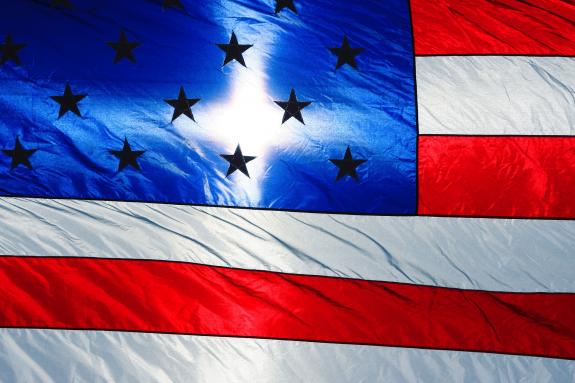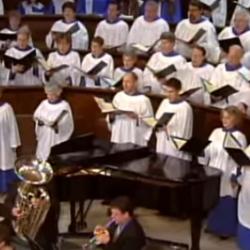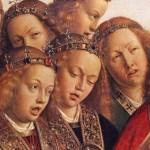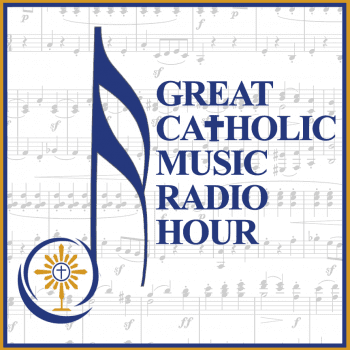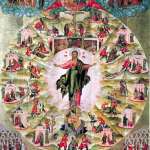I first wrote about this several years back in these pages:
We marked [4th of July] today with a rousing verse of “America the Beautiful,” segueing into “God Bless America” after the final announcements, and before the final blessing. The flag was also dragged out from its place in the corner, and planted prominently beside the pulpit. (Despite that, we heard grumblings about only singing one verse of “America the Beautiful,” as if that were somehow illicit or, at least, irreverent.)
This past Sunday, after Mass (and the traditional singing of “America the Beautiful”), I asked the celebrant, a priest from the Czech Republic, if they do that sort of thing in his homeland. He shook his head. “Never. Maybe on feast of St. Cyril and St. Methodius. But really, no.” I have suspected for a while that this is a distinctly American custom; understandably, it has its supporters and detractors.
Kevin De Young is not a fan:
Please think twice before putting on a Star Spangled gala in church this Sunday. I love to hear the national anthem and “God Bless America” and “My Country, Tis of Thee,” but not in church where the nations gather to worship the King of all peoples. I love to see the presentation of colors and salute our veterans, but these would be better at the Memorial Day parade or during a time of remembrance at the cemetery. Earthly worship should reflect the on-going worship in heaven. And while there are many Americans singing glorious songs to Jesus there, they are not singing songs about the glories of America. We must hold to the traditions of the Apostles in our worship, not the traditions of American history. The church should not ask of her people what is not required in Scripture. So how can we ask the Koreans and Chinese and Mexicans and South Africans in our churches to pledge allegiance to a flag that is not theirs? Are we gathered under the banner of Christ or another banner? Is the church of Jesus Christ–our Jewish Lord and Savior–for those draped in the red, white, and blue or for those washed in the blood of the Lamb?
But others are more sympathetic:
Father John Trigilio Jr., author, co-host of EWTN’s Web of Faith 2.0, and pastor of Our Lady of Good Counsel Church in Marysville, Pa., uses God Bless America for Masses on the Fourth of July and Labor Day.
“Everybody knows it by heart,” he says. He likes the other two hymns and may use them also, but many people don’t know the verses from memory as well as they do for God Bless America.
“Not only is God Bless America easy to sing,” he says, “its theology is on the same page as our Catholic faith.”
Father Trigilio says that using such hymns is “not blind patriotism — my country right or wrong — but it’s a well-reasoned patriotism.”
The priest finds “no problem with patriotic hymns in church, as long as their theology is accurate. I have more problems with Amazing Grace than with using patriotic hymns in church because of the theological problems caused. The central theme of Amazing Grace says we’re a wretch (and) amazing grace covers it over. Catholic theology says different: We are not wretches; we are wounded, and grace heals us.”
What he also finds good about the hymns is that they can “build up unity … as God-fearing Americans.”
It’s worth noting that the Church is silent on this topic; there are no explicit prohibitions in the GIRM regarding patriotic music during the liturgy.
I think popular taste and local custom have a lot to do with keeping these traditions popular. If we stopped singing these songs in my parish around national holidays, the people in the pews would be in an uproar. And context matters. Especially now, when the subject of religious liberty is on many minds, and when so many places around the world are undergoing government-sanctioned religious persecution, it is a gift to be able to express gratitude in song for the freedom we have to worship as we wish. And to acclaim this verse from “America the Beautiful,” about how “thine alabaster cities gleam, undimmed by human tears,” and do it in New York City in 2018, is almost indescribably poignant and powerful.
The other day, writer Sheryl Kaskowitz in The New York Times had an interesting look at the history behind one song we hear frequently in churches, “God Bless America.” It was written in 1918, but she described its particular relevance to our own age:
The song, which rings out with special fervor each Fourth of July as a kind of unofficial national anthem, is turning 100 this year, and at a fraught moment in America’s relations with would-be immigrants, it is worth remembering its origins. Berlin said he first heard the title phrase from his mother, who frequently spoke the words with an emotion he later said “was almost exaltation,” despite their poverty. His daughter Mary Ellin Barrett later wrote that Berlin meant every word: “It was the land he loved. It was his home sweet home. He, the immigrant who had made good, was saying thank you.”
It was a desire to serve his adopted country during World War I that impelled the 30-year-old Berlin, already a successful songwriter, to be naturalized as a citizen in February 1918. That May, he began his military service as an army private at Camp Upton in Yaphank, N.Y., where he was asked to write a soldier show as a fund-raiser. “God Bless America” was originally conceived as the finale for the revue, “Yip, Yip, Yaphank,” but Berlin ultimately decided not to include it. It was shelved and forgotten for 20 years, until he rediscovered the song and provided a revised version to the radio star Kate Smith, who sang it on Nov. 10, 1938, and reprised it weekly.
Berlin’s immigrant success story connected the song, in the period just after its premiere, to a burgeoning public appeal for tolerance in the face of the rise of Nazism in Europe. The first reference to the song in The New York Times describes a performance at a dinner sponsored by the National Conference of Christians and Jews, where religious leaders repudiated the “doctrine of race and hate” in totalitarian Europe and urged Americans not to let it happen within their own communities. Three months later, Berlin led a crowd in “God Bless America” after a speech against bigotry by Eleanor Roosevelt, in which she warned, “Fear arising from intolerance and injustice constitutes the chief danger to our country.”
Whether or not you are hearing it in your church this week, give a listen to it anyway—and maybe, if you are so inclined, offer it as a personal prayer.
Let’s face it: Our country needs prayers now — and God needs to hear from us. Here, then, is the original rendition of a song of hope, and gratitude, and love, written by a young immigrant to his welcoming new homeland.

